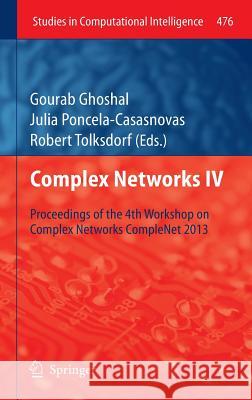Complex Networks IV: Proceedings of the 4th Workshop on Complex Networks Complenet 2013 » książka
Complex Networks IV: Proceedings of the 4th Workshop on Complex Networks Complenet 2013
ISBN-13: 9783642368431 / Angielski / Twarda / 2013 / 195 str.
Complex Networks IV: Proceedings of the 4th Workshop on Complex Networks Complenet 2013
ISBN-13: 9783642368431 / Angielski / Twarda / 2013 / 195 str.
(netto: 575,06 VAT: 5%)
Najniższa cena z 30 dni: 578,30
ok. 16-18 dni roboczych.
Darmowa dostawa!
A network is a mathematical object consisting of a set of points(called vertices or nodes)that are connected to each other in somefashion by lines (called edges). Turns out thissimple descriptioncorresponds to a bewildering array of systems in the real world, ranging from technological ones such as the Internet and WorldWide Web, biological networks such as that of connections of thenervous systems or blood vessels, food webs, protein interactions, infrastructural systems such as networks of roads, airports or the power-grid, to patterns of social acquaintance such as friendship, network ofHollywood actors, connections between business houses and many more. Recent years have witnessed a substantial amount of interest within thescientific community in the properties of these networks. The emergenceof the internet in particular, coupled with the widespread availability ofinexpensive computing resources has facilitated studies ranging fromlarge scale empirical analysis of networks in the real world, to the developmentof theoretical models and tools to explore the various properties of these systems.The study of networks is broadly interdisciplinary and central developments haveoccurred in many fields, including mathematics, physics, computer and informationsciences, biology, and the social sciences.This book brings together a collectionof cutting-edge research in the field from adiversearray of researchers ranging fromphysicists to social scientists, and presents them in acoherent fashion, highlighting thestrong interconnections between the different areas. Topicsincluded are social networks and social media, opinion and innovation diffusion, syncronization, transportation networks and human mobility, as well as theory, modeling and metrics of Complex Networks.











